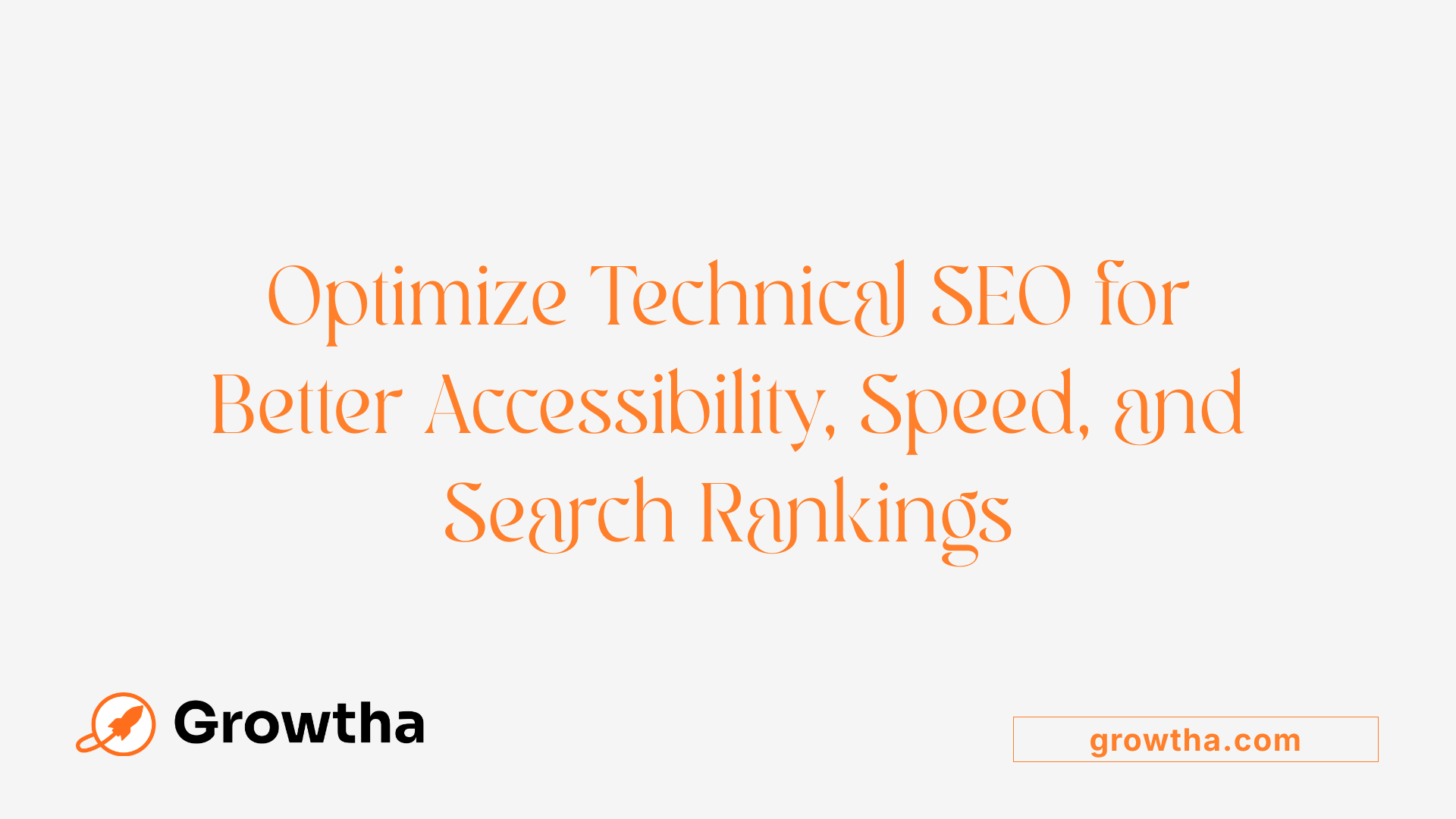The Link Between SEO and Online Reputation in Healthcare
Mastering Digital Trust: How SEO Shapes Healthcare Reputation


The Link Between SEO and Online Reputation in Healthcare
Understanding the Critical Nexus of SEO and Online Reputation in Healthcare
In today’s digital-first world, the relationship between SEO and online reputation stands at the core of healthcare organizations' success. Patients increasingly rely on search engines to find trustworthy providers, making visibility and reputation intertwined assets. This article explores how strategic SEO practices influence patient perception, boost search rankings, and ultimately build a resilient, reputable online presence for healthcare practices.
The Significance of SEO in Healthcare Visibility and Patient Choice

Why is SEO important for healthcare organizations' online presence and patient trust?
Search engine optimization (SEO) is vital in the healthcare industry because it enhances a practice’s visibility in organic search results, making it easier for patients to find trustworthy providers. When potential patients search for symptoms, treatments, or healthcare providers, a well-optimized website appears at the top of Google and Bing search results, increasing the likelihood of patient engagement.
Implementing effective SEO strategies—such as conducting detailed keyword research, creating high-quality and authoritative content, and maintaining accurate local listings—helps healthcare organizations stand out amid competition. These efforts not only attract more local patients but also demonstrate a commitment to transparency and professionalism.
Building trust is further reinforced through positive reviews, testimonials, and accreditation badges that enhance credibility. Ensuring the website is secure, fast, and accessible while complying with privacy regulations like HIPAA increases patient confidence, which is crucial in healthcare.
Overall, healthcare SEO expands an organization’s outreach, strengthens its reputation, and fosters patient trust, ultimately leading to increased patient acquisition and retention.
How do patient reviews influence healthcare SEO and reputation management?
Patient reviews are cornerstone elements of healthcare SEO and reputation management. They generate fresh, user-generated content that naturally incorporates relevant keywords, which search engines recognize as signals of authority.
Positive reviews enhance a healthcare practice’s reputation and boost its search engine rankings, making it more visible to prospective patients. The quantity, recency, and positivity of reviews directly impact local search results, especially in Google’s 3-pack listings and map rankings.
Healthcare providers often actively analyze competitor reviews, conduct keyword research around patient feedback, and create accompanying content—such as testimonials, press releases, and multimedia—that is optimized for search engines.
Utilizing sophisticated tools like SEMrush and Google Analytics, practices can monitor review performance and SEO impact, adjusting strategies accordingly. This ongoing process ensures that positive feedback continues to elevate reputation and search visibility while negative reviews are managed professionally.
Through thoughtful review management and SEO tactics, healthcare providers can enhance their online reputation, foster patient trust, and attract new patients consistently.
What is the role of SEO in managing and improving online reputation in healthcare?
SEO is instrumental in shaping and safeguarding a healthcare organization’s online reputation. It works by ensuring that positive, accurate, and authoritative information ranks higher in search results, effectively controlling the narrative that patients see when searching for a provider.
By optimizing healthcare websites for relevant keywords and claims, and actively claiming and managing local business listings, practices can push negative or outdated content lower in search rankings. Strategies like following E-E-A-T principles—emphasizing Experience, Expertise, Authoritativeness, and Trustworthiness—help establish credibility and reliability.
A user-friendly website that is fast, secure, and accessible further enhances perception of professionalism. Employing long-tail keywords aligned with patient search intent allows practices to connect with the right audience at key decision stages.
Partnering with experienced healthcare SEO specialists ensures that these efforts comply with regulations such as HIPAA while delivering measurable results. In this way, SEO becomes a proactive tool to build, maintain, and enhance a healthcare provider’s online reputation, fostering patient trust and long-term success.
More information on Healthcare SEO and reputation management strategies
For comprehensive strategies in healthcare SEO and reputation management, organizations should focus on a multi-faceted approach. This includes optimizing content for local and medical keywords, enhancing website technical performance, actively managing reviews, and building backlinks from reputable health-specific sites.
Local SEO tactics—such as optimizing Google Business Profiles, maintaining consistent NAP (Name, Address, Phone Number) information, and encouraging positive reviews—are essential for attracting nearby patients. Additionally, integrating schema markup for medical entities and reviews can lead to rich snippets, improving click-through rates.
Content marketing efforts—such as publishing blogs, patient success stories, and educational videos—support SEO while establishing authority and trustworthiness.
Combining these efforts with robust analytics using tools like Google Search Console, Google Analytics, and reputation management platforms enables ongoing refinement and long-term growth.
Ultimately, the synthesis of SEO and reputation management strategies maximizes healthcare providers’ online presence. This comprehensive approach not only improves search rankings but also fosters trust, encourages patient engagement, and drives practice growth.
Integrating SEO and Reputation Management for Optimal Results

Strategies for combining SEO with reputation management
Healthcare providers can create a strong online presence by blending SEO tactics with reputation management practices. This involves developing high-quality, authoritative content that addresses patient concerns, optimized with relevant local keywords to improve visibility in search engine results. Ensuring complete and consistent listings across platforms such as Google My Business, Healthgrades, and Yelp enhances local SEO efforts.
Encouraging satisfied patients to leave positive reviews boosts the practice’s star ratings and review quantity, which search engines view favorably. Responding promptly and professionally to all feedback, including negative reviews, demonstrates commitment to patient satisfaction and helps mitigate damages to reputation.
Utilizing technical SEO elements—such as website speed, mobile responsiveness, and schema markup—further improves user experience and search rankings. Coupling these strategies with active reputation management fosters trustworthiness and attracts new patients.
The Impact of Google and Search Engines on Patient Engagement
Why are patients turning to search engines for health information?
Patients increasingly begin their healthcare journey online, making search engines their primary tool for researching symptoms, treatments, and healthcare providers. The convenience and immediacy of online searches empower patients to gather information quickly before making decisions about their care.
How influential is Google in health-related searches?
Google, as the dominant search engine, handles over 1 billion health-related questions daily. This staggering volume highlights the pivotal role it plays in shaping patient perceptions and decisions. When individuals look up health topics, providers, or facilities, Google’s results influence which options patients consider.
What do statistics reveal about health-related search queries?
Research indicates a significant portion of health searches are local. More than half of all healthcare-related searches are geographically driven, emphasizing the importance of local SEO strategies for healthcare practices. Additionally, a 2015 survey by the American Hospital Association found that over 80% of patients utilize online reviews to select new doctors. The COVID-19 pandemic has further amplified this trend, with a 132% increase in healthcare reviews since its onset.
| Statistic | Data Point | Significance |
|---|---|---|
| Daily health questions on Google | Over 1 billion | Shows high reliance on online sources for health info |
| Patients using reviews to find doctors | 73% | Indicates reviews heavily influence patient choices |
| Increase in healthcare reviews during pandemic | 132% | Demonstrates growing importance of online reputation |
| Patients considering online reviews | 90% | Nearly all patients consult reviews in provider selection |
Why is SEO essential for healthcare organizations?
Search Engine Optimization (SEO) ensures healthcare websites rank higher in search engine results, increasing visibility among prospective patients actively seeking information. An optimized site appears prominently in local searches, maps, and even voice searches, which are rapidly gaining popularity.
How does online reputation impact patient trust and search rankings?
Patient-generated reviews and ratings significantly influence search engine rankings within local search results, including the coveted Google 3-Pack section. High-star ratings, recent positive feedback, and active engagement in response to reviews bolster a practice’s authority and trustworthiness.
What strategies can healthcare providers use to improve their online presence?
Implementing a comprehensive SEO approach involves optimizing Google Business Profiles with complete, accurate information, encouraging and managing patient reviews, and maintaining consistent NAP (Name, Address, Phone Number) data across all directories. High-quality, authoritative content that follows E-E-A-T principles (Experience, Expertise, Authority, Trustworthiness) enhances credibility.
How do reviews influence the online visibility of healthcare providers?
Reviews not only bolster reputation but also serve as fresh, keyword-rich content that can improve search rankings. Google considers review signals such as quantity, velocity, diversity, and star ratings when determining local search prominence. Actively managing reviews through automation tools and engaging with patients can lead to higher rankings and greater patient trust.
The evolving role of AI and digital tools
Artificial Intelligence (AI) assists in analyzing big data for trending keywords, optimizing content for voice search, and automating review requests and responses. These tools help healthcare practices maintain a steady stream of positive feedback and quickly address concerns, all while complying with regulations like HIPAA.
Integrating social media with SEO efforts
Social media platforms amplify content reach, foster patient engagement, and support SEO rankings. Active profiles on relevant channels like Facebook, LinkedIn, and Instagram—which incorporate industry hashtags and link back to the website—help establish credibility and improve search engine visibility.
| Aspect | Practice | Impact |
|---|---|---|
| Search queries | 1 billion+ daily on Google | Broad reach for health information |
| Patient decisions | 73% use online reviews | Emphasizes reputation importance |
| Review signals | Quantity, recency, star ratings | Influence rankings in local results |
| Content strategy | High-quality, E-E-A-T compliant | Builds trust and authority |
| Technology tools | AI for keywords, reviews | Enhances optimization and response |
| Social media | Active presence on key platforms | Boosts visibility and engagement |
Adopting these strategies enables healthcare providers to capitalize on the high volume of online health searches. By focusing on both technical SEO and reputation management, practices can serve patients better and stand out in a crowded digital landscape.
Technical SEO and Content Optimization in Healthcare

What is the role of SEO in managing and improving online reputation in healthcare?
Search Engine Optimization (SEO) is essential for healthcare providers aiming to shape a positive online image. By boosting the visibility of trustworthy, positive content in search engine results, SEO helps foster patient trust and confidence. Proper SEO strategies include optimizing healthcare websites for relevant keywords, managing local business listings like Google My Business, and adhering to the principles of E-E-A-T—Experience, Expertise, Authority, and Trustworthiness.
Healthcare SEO also involves proactive reputation management—responding to patient reviews, encouraging satisfied patients to share feedback, and suppressing negative content through targeted search strategies. A secure, user-friendly website that offers accurate, comprehensive information reflects professionalism and reliability. Furthermore, focusing on long-tail keywords aligned with patient search intent enhances the chance of engaging the right audience at the critical decision-making stage.
Partnering with skilled healthcare SEO professionals ensures compliance with regulations such as HIPAA while delivering measurable improvements in online reputation. In sum, SEO acts as a strategic tool that positions healthcare practices favorably, encouraging patient trust and driving new patient acquisition.
Content Creation and Content Strategy in Healthcare SEO

Why is SEO important for healthcare organizations' online presence and patient trust?
Search engine optimization (SEO) is vital for healthcare providers because it directly influences how easily potential patients can find them online. When healthcare websites appear at the top of search results, it signals authority and reliability, encouraging patient engagement. Effective SEO strategies—like relevant keyword use, high-quality content, and accurate local listings—help practices attract those seeking medical services.
Beyond visibility, SEO fosters trust through positive online reviews, testimonials, and credible accreditation. A well-optimized website that is secure, fast, and accessible can boost patient confidence, ensuring they feel safe sharing personal health information. Overall, good SEO expands a healthcare entity’s reach, enhances its reputation, and sustains long-term growth by reinforcing trust in the digital space.
How does high-quality content following E-E-A-T principles improve healthcare search rankings?
Creating content that demonstrates Experience, Expertise, Authoritativeness, and Trustworthiness (E-E-A-T) is essential for healthcare SEO success. This means producing accurate, detailed information backed by qualified professionals and current research. High-quality content—such as comprehensive explanations of medical conditions, treatment options, and patient success stories—addresses user intent effectively.
Regular updates that reflect the latest clinical guidelines and scientific evidence enhance a site’s relevance and authority. Content reviewed by medical experts not only improves rankings but also builds patient trust, positioning the practice as a credible, reliable source of health information. Search engines reward such authoritative content with higher visibility, making it easier for patients to find trustworthy providers.
What role does multimedia content play in healthcare SEO and reputation building?
Multimedia elements like videos, infographics, and patient testimonials significantly enrich healthcare websites, providing a more engaging user experience. Videos are especially useful for explaining complex medical procedures or health tips in an accessible way, encouraging visitors to spend more time on the site and share content.
Infographics visually communicate data, health facts, and treatment benefits, which not only make content more shareable but also boost backlinks—an important factor in SEO. Patient success stories and testimonials humanize the practice, showcasing real-world positive outcomes and fostering trust.
Search engines increasingly favor diverse content formats that promote engagement. In addition, multimedia content enhances reputation by demonstrating transparency and patient-centric care, establishing the practice as an authoritative and caring health resource.
What are the essential components of a healthcare website’s technical SEO?
Technical SEO forms the foundation for effective healthcare SEO practices. Critical elements include ensuring fast site speed through image optimization, minimized code, and caching strategies. Mobile responsiveness is also imperative, as many patients access healthcare information via smartphones and tablets.
Security via HTTPS protects patient data and aligns with privacy regulations like HIPAA, boosting patient confidence. Implementing structured data markup—such as MedicalOrganization, Review, and FAQ schema—helps search engines understand and display content effectively, often resulting in rich snippets that improve visibility.
Regular technical audits are necessary to identify and fix issues, ensuring the site meets the latest SEO standards. An optimized technical infrastructure enhances discoverability, user experience, and trust, all essential for attracting and retaining patients in the competitive healthcare landscape.
The Future of Healthcare SEO and Reputation Management
What emerging trends at the intersection of healthcare SEO and reputation management?
The landscape of healthcare SEO and reputation management is rapidly evolving. Emerging trends include the increased use of AI-powered review analysis tools, which monitor patient feedback in real time. These tools enable providers to respond swiftly to reviews and anticipate patient sentiment shifts, helping to proactively manage online reputation.
Video testimonials are predicted to become a cornerstone by 2025. Authentic patient stories shared through videos can enhance trust and visibility, significantly boosting SEO rankings as search engines favor multimedia content that engages users.
Blockchain technology is set to improve transparency and security within review systems. By verifying identities and preventing review tampering, blockchain enhances patient confidence and ensures that reviews are genuine and trustworthy.
Furthermore, integration with wearables and patient portals allows for continuous, real-time feedback. This dynamic data can be used to adjust care and communication strategies, strengthening reputation management through personalized engagement.
Finally, a focus on diversity, equity, and inclusion (DEI) initiatives and optimizing local SEO—such as maintaining up-to-date Google Business Profiles and developing localized content—are shaping the credibility and trustworthiness of healthcare providers online. These trends collectively aim to create a more transparent, engaging, and trustworthy digital environment.
How can AI improve healthcare SEO and reputation management?
AI technology plays a pivotal role in enhancing healthcare SEO and reputation management efforts. By personalizing search experiences, AI tailors content delivery based on patient preferences and behaviors. It also optimizes content and automates routine SEO tasks, ensuring that healthcare providers remain competitive.
AI-driven analysis tools help identify trending keywords, assess competitor strategies, and measure user engagement. This data-driven approach allows for precise content creation and keyword placement, improving search rankings.
Virtual assistants and AI call agents like SimboConnect automate essential tasks such as answering patient calls, scheduling appointments, and collecting feedback. These systems not only reduce staff workload but also ensure HIPAA compliance, maintaining patient privacy.
Support for content creation is another advantage of AI, which can generate blog ideas and optimize existing materials. AI enables continuous adaptation to changing search patterns and regulatory standards, ultimately maintaining high search rankings and enhancing reputation.
What role will blockchain and wearables play in the future of healthcare reputation management?
Blockchain technology offers promising benefits for review transparency and security. By verifying patient identities and ensuring reviews aren’t tampered with, blockchain can create a more trustworthy feedback ecosystem. This fosters increased patient confidence, discourages fake reviews, and demonstrates a commitment to integrity.
Wearables and connected health devices are revolutionizing real-time feedback collection. These tools gather continuous health data and satisfaction metrics, offering personalized insights into patient experiences. When integrated into reputation systems, wearables help showcase ongoing care quality and responsiveness, strengthening online credibility.
This integration allows healthcare providers to demonstrate their commitment to patient-centered care actively. As these technologies become more mainstream, they are poised to fundamentally transform reputation management. They provide secure, personalized, and transparent avenues for monitoring and enhancing healthcare organizations’ digital reputation, fostering a climate of trust and accountability.
| Trend/Technology | Description | Impact on Healthcare SEO & Reputation Management |
|---|---|---|
| AI and Machine Learning | Personalizes content, analyzes data, automates SEO tasks | Boosts rankings, enhances patient engagement, fosters trust |
| Video Testimonials | Authentic patient stories shared via video | Increases engagement, trust, and SEO visibility |
| Blockchain | Verifies reviews, prevents tampering | Ensures review authenticity, increases confidence |
| Wearables & Patient Portals | Ongoing real-time feedback | Provides personalized reputation insights |
| Focus on DEI & Local SEO | Inclusive and localized content | Builds credibility and attracts nearby patients |
Staying ahead in healthcare SEO and reputation management requires embracing these innovations. By integrating AI, blockchain, and wearable technologies, healthcare organizations can create a more transparent, engaging, and authoritative online presence, ultimately leading to better patient trust and business growth.
Building a Resilient Digital Reputation
In conclusion, the symbiotic relationship between SEO and online reputation is critical for healthcare practices seeking to thrive in a competitive, digital landscape. Strategic SEO efforts enhance visibility, attract patients, and bolster credibility through authoritative content, positive reviews, and technical excellence. Meanwhile, managing online reputation—through review solicitation, responses, and reputation monitoring—further elevates search rankings and patient trust. Embracing emerging trends like AI analysis, video testimonials, and blockchain verification will position healthcare providers to meet evolving patient expectations and regulatory standards. By integrating these approaches into a cohesive digital marketing plan, healthcare organizations can build a resilient, trustworthy online presence that supports long-term success and delivers exceptional patient care.
References
- How Online Reputation Can Boost Your Practice's Search Engine ...
- The Significance of SEO and Online Reviews in Enhancing ...
- How Healthcare Reviews Impact Your SEO | Simply Be Found
- Reputation SEO for Healthcare Providers: An Introduction - rater8
- Healthcare SEO: The Ultimate Guide to Medical SEO in 2025
- Combining SEO and Social Media for Healthcare Practices - Blog
- The SEO Advantage in Healthcare Reputation Management







